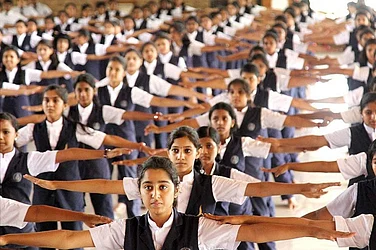Habba Kadal was a constituency in Srinagar’s old city in Kashmir named after the last queen of independent Kashmir, Habba Khatun. In the draft interim report of the delimitation commission, it is no longer is a constituency. The political parties are not taking it lightly. They are saying it is obliterating the cultural history of Kashmir and creating a new history.
Habba Khatun, named Zoon was a Kashmiri poetess in the 16th century and queen of the last king of independent king of Kashmir, Yusuf Shah Chak. Chak, who ruled Kashmir from 1579 to 1586, and was one of the last native rulers of independent Kashmir, before Mughal ruler Akbar the Great annexed Kashmir and exiled Chak to Bihar.
Gulmarg was also a constituency. But in the delimitation commission report, it has been obliterated. Gulmarg is made of two Persian words Gul and Marg. Gul means flowers and Marg means meadow. Thus, Gulmarg means is a meadow of flowers. It is said Yousuf Shah Chak discovered and named Gulmarg.
Gandhi Nagar was a constituency in Jammu. It has been removed. Not only this. Amirakadal, named after Governor Amir Khan, who had made a significant contribution to the architecture and urban development of J&K has also been erased as a constituency.
“It appears the Delimitation Commission is being used as a device to deface and obliterate history and make an assault on culture. It is shocking when efforts are being made to restore old names of cities and towns in the country, a conscious effort is being made to obliterate and remove history and culture of Jammu and Kashmir,” says National Conference in its objections to the delimitation commission interim report.
The delimitation commission has obliterated a number of Constituencies of historical importance. They are: Habakadal, Amirakadal, Zadibal, Shangus, Kokernag, Sangrama, Gulmarg, Hom Shali Bugh, Inderwal, Gandhi Nagar and nine others.
“These constituencies are made to disappear and completely obliterated unmindful of their emotional, psychological value and importance. It appears it is being used as a device to deface and obliterate history and make an assault on culture. It is shocking when efforts are being made to restore old names of cities and towns in the country, a conscious effort is being made to obliterate and remove history and culture of Jammu and Kashmir,” the NC says.
“The names of places, towns and cities are symbols of culture and history and deserve to be respected. The constituencies, therefore, must be restored,” the NC says.
The NC further says what can be a more shocking example of unrealistic, illogical and irrational demarcation of a parliamentary constituency than that of Anantnag constituency.
“The Commission has joined Anantnag, Kulgam and Zainapora from Shopian district with Poonch and Rajouri districts without any regard for the terrain, geography, connectivity, accessibility, and overall convenience. The Commission has not in the least considered that Anantnag, Kulgam and Zainpora are separated by mighty Pir Panchal range and the area are inaccessible for half the year because of heavy snowfall,” it adds.
The Commission owes its origin and existence to section 3 of the Delimitation Act, 2002. The Central Government in the exercise of powers under section 3 of the Delimitation act on March 6, 2020, constituted the Commission. The Delimitation Act 2002 was not applicable to the state of Jammu and Kashmir. It was made applicable to Jammu and Kashmir UT by Section 96 of the Jammu and Kashmir (Reorganisation) Act 2019 and the corresponding law Jammu and Kashmir Representation of Peoples Act, 1957 was repealed.
“The Jammu and Kashmir (Reorganisation) Act 2019 is under judicial scrutiny. The constitutional validity of the law, under which the Commission has been constituted being examined by the highest constitution Court of the country. The constitution validity and jurisdiction of the Commission is also under examination of the Apex Court. The Commission is therefore under the all-important norms and principles of constitutional proprietary and out of deference to the Supreme Court required to stop the exercise till the judgment is rendered in the matter,” the NC says.
Questioning criteria adopted in redrawing boundaries of the constituencies and giving six seats to Jammu and only one to Kashmir, the NC says, “the population as the first and foremost criteria of delimiting the constituencies. But it has not been given the place of prominence it must have in criteria, it deserves.”


























